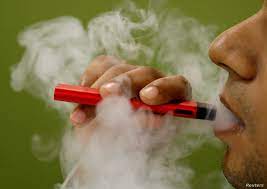
Vaping of
e-cigarettes remains very popular among teenagers. Across the country, about
20% of high school seniors report that they are currently vaping. We do not
know how this compares to what is happening in our community. Yet I see many
kids in our community vaping, and wonder if they are aware of the health
consequences.
As
a parent and as a psychologist, my biggest worry is that kids who vape will
develop nicotine addiction, more formally called tobacco use disorder. Nicotine is extracted from tobacco, and is
the active ingredient in most vapes. It is a stimulant that increases heart
rate and blood pressure. Kids like vapes because nicotine improves alertness,
focus, and memory. The problem is that over a very short period of time,
nicotine can cause depression, reduce alertness and focus, and impair memory
and learning. Many kids who start vaping report how difficult it is to make it
through the school day or take a test.
Kids
tend to vape repeatedly over long periods of time because nicotine is a highly
addictive drug, comparable to substances like alcohol, cocaine, or marijuana.
Nicotine addiction can occur very quickly, and many teenagers who try vaping
will become addicted to it. Once addicted, it becomes very difficult to stop.
What
does it mean to be addicted to vaping? Some of the most easily recognized
symptoms of tobacco use disorder are craving, withdrawal, and tolerance.
Craving is the intense desire to use nicotine, when the thought of smoking
remains on your mind and is easily triggered by emotions or circumstances.
Withdrawal from nicotine can occur between periods of use, and is characterized
by headaches, irritability, anxiety, and sadness. Naturally, the best way to
relieve these symptoms to is to smoke more nicotine. Tolerance occurs when the
body needs more of the drug to gain the same effect. Vaping tolerance often
leads to smoking more often and using more potent nicotine. These factors
conspire to make it difficult to stop.
Another
problem with tolerance is that it often leads kids to supplement or substitute
vaping with traditional combustible cigarettes. It looks like about half of the
kids who start to vape will ultimately move to traditional cigarettes. Studies
also show that kids who vape begin to minimize the dangers of traditional
cigarettes. We all know that introducing cigarette toxins to the body is life
threatening. Cigarette smoking remains the leading cause of preventable
death.
There
is also a clear connection between vaping and misuse of other substances like
alcohol and marijuana. Some scientists believe the relationship is causal –
that nicotine alters the brain in ways that increase the rewarding nature of
other drugs. Others see the connection as social, with kids who vape hanging
out more with kids who have access to drugs.
We
should keep in mind that for many kids, nicotine use may be “self-medicating”
symptoms like inattention or anxiety that are not properly treated. Imagine the
relief that a child with ADHD might feel after taking his first vape hit. Of
course, there are much more effective and safer treatments for ADHD than
vaping. And what the child does not know is that vaping will simply make
attention problems worse over time.
In a world of competing narratives, we need to
do better at teaching children the facts about vaping and its relationship to
nicotine addiction. Kids who are having trouble stopping should feel
comfortable speaking with a parent, teacher, or rabbi about what to do. Arranging
an appointment with the pediatrician is a good first step, as pediatricians are
gaining more and more experience in helping children and their parents navigate
this problem. They are also a good source for referrals to therapists who are increasingly being asked to help kids with this
problem that does not seem to be going away any time soon.
Dr.
Kidorf is a clinical psychologist and Associate Professor of Psychiatry and
Behavioral Sciences, Johns Hopkins University School of Medicine.
This article is presented by
Chayeinu, an organization dedicated to providing education and guidance to our
community regarding substance use disorder.






